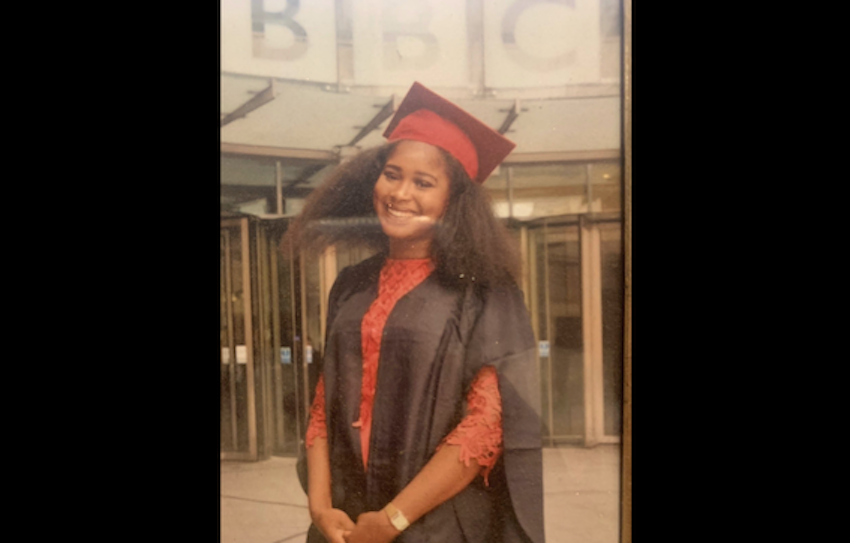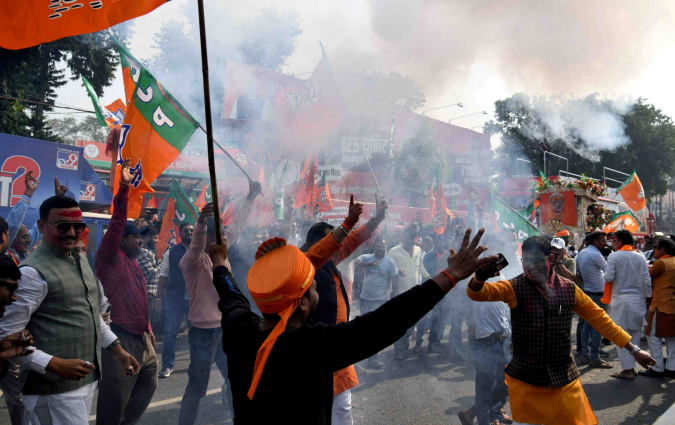Newsrooms need young journalists. Here's how to create a place where they flourish

Izin after graduating at the BBC.
This is a lightly-edited excerpt of Izin Akhabau's opening remarks during an event that was part of our global journalism seminar series. Izin is the online editor of 'The Voice', a British Black national newspaper. Before joining 'The Voice', she worked at 'Black Ballad' and at the BBC.
My name is Izin. I’m in my twenties, which is still young – though not as young as I was in my teens when I was first commissioned to write.
I decided to become a journalist who told the stories that were not usually told after volunteering with Romany Gypsy communities in Bosnia and Herzegovina at the age of 16. I met a girl called Maya who was the same age as me, and had just finished her exams like me – but in far more difficult circumstances. Meeting Maya was a good lesson for me in how privilege is not only having something that others do not have. Privilege also precludes us from being able to fully appreciate and understand things in ways that others can.
That vocabulary is missing from how we discuss privilege because we seem to only think it’s about those of us with privilege being benevolent and sharing it, rather than how it’s also about those of us with privilege recognising how our privilege makes us ignorant and blinkered.
After that experience in Bosnia and Herzegovina, I was lucky enough to meet someone else who was passionate about telling the stories that are not usually told. Her name is Tobi Oredein and she started Black Ballad, an online magazine that was specifically for Black British women.
As a young journalist, she got so tired of applying for jobs that she felt that if she could just start her own media organisation, traditional media outlets would see her potential and give her a job. At Black Ballad, I mainly did investigative pieces on topics such as how Black women were affected by the criminal justice or the immigration system.
After working with Tobi, I was selected as one of the BBC’s first digital journalism apprentices. There were only ten of us but the scheme has since grown year after year. Here, I got a real breadth of experience working at Newsnight, Radio 4’s World at One, BBC Politics Live and Digital Video, which would become my BBC freelance home. It was during my apprenticeship that I realised something really important that I’ll come back to. There was a tendency of some younger trainees to be really dismissive of some older journalists and how they struggled on social media. There was also a tendency of some older journalists to see the younger trainees as inconveniences they weren’t sure what to do with. On both sides, there was an inability to see how the strengths of the other could contribute to a stronger whole if the relationship was properly nurtured.
Watch Izin's talk
Why you should hire a young journalist
Why would you choose to have a young journalist in the newsroom?
I am a fan of the social media trend where people ask for wrong answers only, so let’s start with that to have some fun.
You can pay young journalists less, or nothing at all. This is not a reason to hire young journalists as I am sure all the learned people know, because it contributes to a lack of diversity in newsrooms.
This point makes me think about a meeting I was in this summer where a white colleague said in the midst of a discussion about Black Lives Matter on Zoom: “Now I come to think of it, XYZ department is incredibly white.” I mean he was right, but it just made me laugh that it seemed to be the first time it had occurred to them.
While I am always behind initiatives to make sure people can learn journalism as a trade and get paid at the same time, I think it is important to think critically about how these schemes can almost become smoke screens for an organisation's inability to retain diverse colleagues who join their media organisations.
Are diverse staff who have put up with discrimination at your organisation as long as I have been alive also being recognised in these moments in discussions about global racism? If you can’t retain, support, develop and recognise the diverse talent that is already in your organisation, there is an element of you inviting young people into an environment where it will be difficult for them to exist during a difficult time in their lives. Have you considered how your institution's processes are biased before recruiting young talent?
Another reason, though I don’t think this is as much the case any more, is that some people think young journalists have social media magic at our fingertips that we can sprinkle across newsrooms like fairy dust.
These are all wrong reasons to hire young journalists, but they are reasons why young journalists do get hired in our industry.
Here are some of the right reasons I think young journalists should get hired.
I exist at many intersections as a journalist, and it can be difficult to exist in an industry that continuously perpetuates one way of seeing the world. Those that won’t tell you that are afraid of telling the truth.
However, what I will say is that existing on the margins is also a blessing of perspective. When you see the way that others can be so unknowingly unaware, it can give you the gift of self-reflection. So I believe in the importance of having young journalists in newsrooms for the same reasons that I believe in having Black journalists, woman journalists, working class journalists, disabled journalists, queer journalists and journalists at every other intersection.
Why perspective matters
There is the world that we exist in before we enter your newsrooms. Then we enter the media world and we learn to exist in it too, and so immediately we become aware that there is not just one way of seeing the world.
This constant feeling that I myself don’t have the full story has led me to stories about what life is like for disabled clubbers, how the first woman to run for US president was Black, the deadly trade around the world’s most expensive fish or how deportation officers were working for charities as flights were grounded due to the COVID-19 pandemic.
That different perspective also means that I see things which are universally seen in my industry as norm as problematic. Defamation law, for example, means that we question printing what someone less rich or powerful says about someone richer and more powerful. But how are the more privileged protected to the detriment of the less privileged? Who is repeatedly forced to fulfil the burden of proof or prove they have the right to exist?
I am also sensitive to the way that impartiality is presented as a standard that is equally fair for everyone, when I have witnessed how it is weaponised against high profile female journalists of colour on more than one occasion.
But if I go briefly back to young journalists, you can see the benefit of their perspective in the way some of the most exciting young journalists today approach storytelling. I think for example of the excellent Nadine White at Huffpost and how she uses Twitter or Sophia Smith Geler’s use of TikTok at the BBC.
There is also something to be said for the way that a fresh pair of eyes can see things differently, or brings new energy to initiatives everyone would like to implement but have never got round to because they are stuck in specific cycles.
Again, let’s start with some of the ways you do not get the best out of young journalists. I can distinctly remember my first office party as a very young journalist, and being challenged to twerk by an older white and very respected journalist. It had taken a lot of convincing for me to even arrive at that Christmas party and that element of the experience made me very uncomfortable. How do we deal with these characters that exist in media environments? Though young adults are vulnerable, safeguarding is especially important for those who are under 18.
The 'Pygmalion effect'
I’m a big believer in the Pygmalion effect. In essence, the Pygmalion effect as I understand it means that if you have high expectations of people they will meet those expectations and if you have low expectations of people, they will underachieve and underperform.
I firmly believe that the newsroom is not insulated from stereotypes that permeate wider society about certain groups of people, and what they are able to achieve. I have had senior colleagues insinuate that I was incapable of writing text accompaniment for online video after having written whole articles for the national press. I also spent some time subbing and coordinating video from bureaus around the world at a planning desk fairly early on in my career because someone thought I could do it. In both cases, I did what was expected of me. In the first case, it was assumed that I could do far less than I could reasonably do. In the other case, it was assumed that I could do far more. That’s important when you think about the tasks you set young journalists.
If you see potential in a young journalist, then put the support in place and prepare to be surprised in a good way. Also, be prepared to see something not working out for what it is. Not an indictment of competency, character or ability but just something not working out. Consider the way that certain journalists get the benefit of the doubt, and the ability to move on after messing up, and how this is influenced by class and race.
Inexperienced younger trainee journalists are probably coming into an environment where you are all used to operating like a well-oiled machine. This can be intimidating. How sensitive are you to this? Now I have to lead editorial meetings but I found them extremely challenging at some point, especially in an environment where I was a minority. I have a distinct memory of plucking up all my courage to suggest an idea in an editorial meeting as an apprentice, but speaking so quietly that almost no one heard me because I was afraid. The one person that did asked me to repeat myself and that made all the difference.
To get around this, I would email pitches or use trusted, kind colleagues as sounding boards before pitching and suggesting ideas in meetings. Are there any young people or aspiring journalists for whom you can be a listening ear?
I can also think of an example where somebody took over a fellow apprentice’s desk and the team leader made it very clear that that was unacceptable. Do young journalists in your newsroom feel that they have a backer or an advocate in you? This is especially important if you’re in a position of authority.
As an apprentice I would come up with my own concepts and ideas and show the rest of the team. If you know the team is busy, it might be worth setting a new journalist a task they can work on independently and report back to you later. What’s something you have wanted to do differently for some time - and have considered getting a fresh pair of eyes on? Give your journalist time to consider it and seriously consider their perspective. Being able to make contributions like this wards off imposter syndrome.
Learning from each other
I joined the industry as a teenager at a time when some traditional or more established journalists were still getting to grips with social media. As a result, I was able to do some really cool things like attending meetings at YouTube and look at how to improve Newsnight’s digital strategy, use Instagram for the first time on BBC Politics Live or livestream on Periscope for Radio 4’s World at One. On some occasions, I was asked to write guides on what I had done for other more senior journalists. It’s only in retrospect that I see these things as innovative, or anything special.
I also benefited massively from seeing how so many more experienced journalists worked. I benefited from their mentorship, and learned from their experience. Each one of my journalistic achievements are the product of working relationships, because as humans we very rarely do things in isolation.
So much time and energy is wasted in our industry by more traditional outlets that sneer at the work of new and emerging media organisations. The same is true for some newer media organisations too, which can sometimes be dismissive of outlets that have served audiences for generations. But in what ways are both parties enriched by seeing the merit, skill and competence in what the other does? How can the type of journalism we do improve when we see merit in a range of approaches, from perspectives that are different to our own? How do we develop relationships in newsrooms that are strong enough to withstand these differences without assuming the inherent superiority of one over the other?
It’s so vitally important that we have young voices in newsrooms but also that we cultivate mutually beneficial relationships between younger and older journalists, and all other groups that allow us to flourish as we learn from each other.





